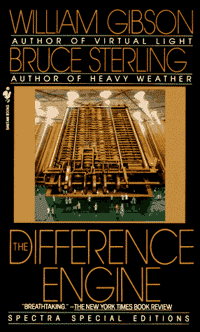
I feel sort of silly addressing this concern. I mean, who honestly complains that a story "doesn't really go anywhere?"
The defense of The Difference Engine seems easily summed up by the number of positive reviews shutting these complaints down with "The plotlines were clearly seen through in the third portion." So I'm not even going to bother dealing with it. What surprises me here is that readers still insist on that sort of closure in books, generally. Granted, it takes all kinds, but this insistence on "tying up loose ends" is usually code for "why isn't there a happy ending?" Things as straightforward as "He never saw Molly again" wouldn't be the kind of summary these people would find satisfying. The beatniks (whose work I first read about the same time as Gibson, a decade ago) taught me that "endings" aren't really endings, just places where the narrative stops. Their books were full of ups and downs and amazing joys and deep sorrows, and that sort of emotional cycle isn't contained within the arc of a story but repeats itself endlessly throughout a lifetime. I could sprinkle this post with names of brilliant books with meandering plotlines and unhappy endings, but I'd hate to belabour the point. I'd rather purchase copies and deliver them to these reviewers, because the only conclusion I can make is that They Must Not Read Very Much. Not a crime, in and of itself, but sort of silly for one who undertakes to review books on a book website. (Don't even get me started on the spelling and grammar.)
And we're still talking about traditional narrative here -- a lot of these naysayers mention that the subplots in The Difference Engine are more like vignettes, glimpses into lives in progress painted in broad strokes. A vignette style can be one of the most powerful ones in use, if you know how to use it (the best example being Georges Perec's Life A User's Manual, which not only uses the tableau as a successful gimmick but pushes it to a career-defining grace). If the complaint is that these writers don't know how to use it, well, that's not really the same thing, is it?
It's just about enough to make me give up reading other people's reviews. The most important thing I learned from writing music criticism is that you have to let the readers in on a little bit about yourself - something small but telling, so they'll know right away whether they're aligned with or against you. It's the only way for them to know whether they want to obey or disobey your commands. Who the writer is is as important as what the writer writes. Again, it takes all kinds, but if the people writing these critiques are the kind of people who can't be satisfied with an unhappy ending or a non-fairy-tale, I can't see myself being anything other than overjoyed to embrace The Difference Engine. The enemy of my enemy is my friend.
- Allana
Known Issues, part two.
Written by Allana on Tuesday, March 30, 2010
Subscribe to:
Post Comments (Atom)




No comments:
Post a Comment